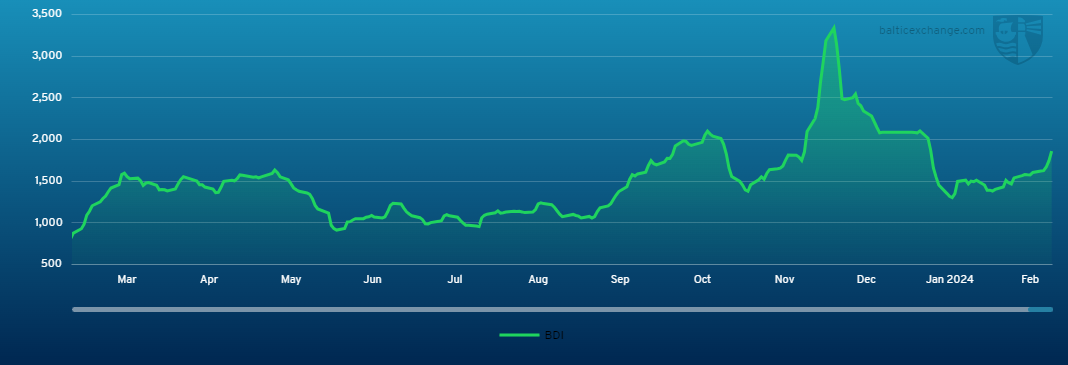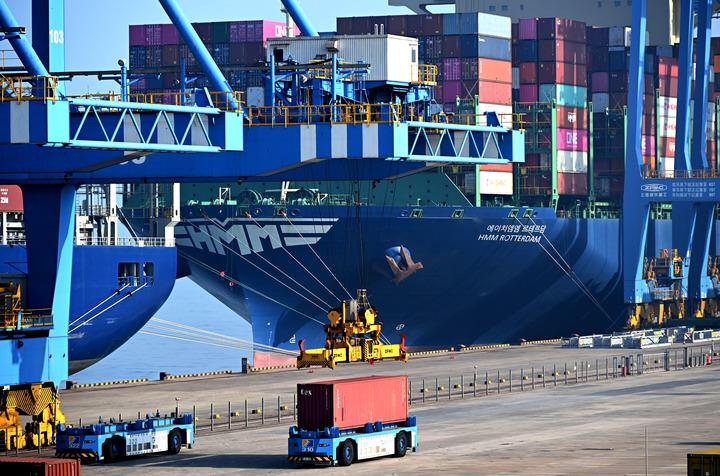BEIJING, Feb. 26 (Xinhua) -- The Baltic Exchange has published its weekly report of the dry and tanker markets for February 19-23, 2024 as below:
Capesize
Throughout the week, the capes witnessed a notable increase in activity after a slow start. This uptick is evidenced by the BCI 5TC, which commenced at $20,378 on Feb. 19, experienced a slight dip on Tuesday, and rose to $26,079 by Friday's close. Early in the week there were reports in the Pacific of weather factors that could potentially cause delays. Strong winds and dense fog forced the closure of several ports in China. Additionally, attention was drawn to a tropical cyclone expected to move west across the Kimberley region in Western Australia, prompting mining companies to monitor the situation closely and leading to reduced activity on C5. However, by mid-week, the level of activity in both the Atlantic and Pacific picked up as well as the market. The Atlantic was extremely busy, particularly from south Brazil and West Africa to the Far East with several fixtures being concluded on C3, initially there were reports of $24 being fixed, followed by $24.75, then on Thursday reports of $25.75, resulting in a 1.73 increase on the C3 index from Tuesday to Thursday, which published at $25.65, then the C3 index has risen by 0.53 to $26.180. In the Pacific all three major miners were active towards the end of the week, brokers observed a slight tightening in tonnage availability against a healthy cargo list, resulting in fixtures on C5 moving up quickly from $9.50 levels to $10.50 and as the week draws to a close there have been reports of low $11.00s being concluded, with the C5 index rising by 0.815 to $11.205. All in all, it has been a very positive end to the week.
Panamax
It returned a week of steady declines for the Panamax market. With the Atlantic basin providing a heavy ballaster list and increased tonnage count, resistance proved to be mostly scarce. This resulted in charterers driving down bids, noticeably for the few trans-Atlantic runs, whereas from South America the nearby dates remained heavily discounted, an 82,000dwt delivery aps load EC South America early March dates agreeing to $17,000 + $700,000 for a trip redelivery Singapore-Japan. Asia bucking the trend for the first part of the week returned decent levels of activity culminating in firmer rates only to falter a little as the week ended with several deals fixing and failing mid-week and we end the week with a mostly flat outlook with split views and the bid/offer spread widening. NoPac rounds initially concluding closer to $16,000 were now mean priced at around the $15,000 mark. Period activity limited, the highlight being an 82,000dwt delivery China fixed basis 1 year at $18,000.
Ultramax/Supramax
Rather mixed fortunes for the sector over the past week. The Atlantic was described as positional by many as limited fresh enquiry was seen from the US Gulf and Continent – Mediterranean regions seeing an easing of rates. However, from the south Atlantic demand remained which kept rates relatively stable. By contrast a good amount of fresh enquiry was seen in both the Indian Ocean and Asia leading to stronger rates being achievable. In the Atlantic, a 61,000dwt fixed a trip from West Africa to China with iron ore in the upper $20,000s. Whilst another 61,000dwt fixed a trip from the Continent to the east Mediterranean at $18,000. From Asia, a 54,000dwt fixed from Singapore for a trip via Indonesia to China at $16,000. Whilst a 57,000dwt open Inchon fixed a round voyage via Australia in the mid $11,000s. In the Indian Ocean, a 64,000dwt fixed a tripe delivery Port Elizabeth redelivery China at $26,000 plus $260,000 ballast bonus.
Handysize
Gains were seen on the BHSI this week mainly led by the resurgence in the Pacific with levels of fresh enquiry improving across Australia, Indonesia, China and NoPac, a 33,000dwt opening in Fangcheng was fixed via Vietnam with redelivery Singapore-Japan with an intended cargo of cement at $6,500 whilst a 32,000dwt opening in Japan was fixed for a round trip via Nopac at $10,000. Period interest also remained with a 33,000dwt opening in China linked to fixing for four to six months at $11,550, whilst a 28,000dwt opening in WC India fixed for multiple legs at $10,000. The Continent remained active with a 37,000dwt opening in Immingham fixing via Murmansk to Brazil with an intended cargo of fertilizer at $17,000. With recent reductions to the draft in the River Plate Charterers are now having to utilize larger vessels to lift the handy stems. The lack of cargo in the US Gulf continued with a 37,000dwt fixing from Savannah to the Continent with pellets at $10,500.
Clean
LR2
LR freight levels in the MEG continued downward this week. The 75kt MEG/Japan TC1 index shed 54.44 points to WS190.56. The 90kt MEG/UK-Continent TC20 trip to the UK-Continent steadily came down from $6.12 million to $5.06 million.
West of Suez, Mediterranean/East LR2’s remained level all week with little open market activity. The TC15 index remained between $5.85 million and $5.9 million.
LR1
In the MEG, LR1 freight remined under pressure this week. The 55kt MEG/Japan index of TC5 was again pushed down to the tune of 35 points to WS208.13. The 65kt MEG/UK-Continent of TC8 lost a little over $700,000 of its value across the week settling down at $4.44 million.
On the UK-Continent, the 60kt ARA/West Africa TC16 run for the second week has been relatively dormant, the index shed 10.86 points to WS216.25. This is still $43,000/day Baltic round trip TCE.
MR
MR’s in the MEG made a resurgence after a flurry of activity mid-week, the TC17 index climbed from WS287.14 to WS302.86.
UK-Continent MR’s plateaued and then ticked back downward this week. The 37kt ARA/US-Atlantic coast of TC2 index went from WS246 to WS221 although is currently marked at WS229 so it would appear a floor has been reached for the moment. On a TC19 run (37kt ARA/West Africa) the index followed suit of TC2 bottoming out at WS237 from WS260 to then return to WS249.
The USG MR’s have been arguably a little lethargic this week. TC14 (38kt US-Gulf/UK-Continent) went from WS186.79 to WS173.93. The 38kt US Gulf/Brazil on TC18 also dipped 8.57 points to WS254.29. The 38kt US-Gulf/Caribbean TC21 dropped 5% to $857,143.
Handymax
In the Mediterranean, Handymax’s looked to have levelled off for the moment and the TC6 index hovered around WS277.5-WS280 all week.
Up in north west Europe, the TC23 30kt Cross UK-Continent similarly remained flat around the WS250 mark.
VLCC
The market tumbled this week with Middle East Gulf players leading the retreat. The rate for the 270,000 mt Middle East Gulf to China route lost over 25 points to be last assessed at WS67.86 which corresponds to a daily round-trip TCE of $44,612 basis the Baltic Exchange’s vessel description.
In the Atlantic market, the 260,000 mt West Africa/China was reduced by 18 points to WS70.10 which shows a round voyage TCE of $47,598 per day, while the rate for 270,000 mt US Gulf/China was slimmed by $711,111 to $9,388,889 (providing a round-trip daily TCE of $47,524).
Suezmax
Suezmaxes in West Africa eased further this week with the rate for 130,000 mt Nigeria/UK Continent slipping four points to WS109.09 (a daily round-trip TCE of $41,747). In the Mediterranean and Black Sea region the rate for 135,000 mt CPC/Med slid sharply down by 13 points to WS115.20 (showing a daily TCE of $42,666 round-trip). In the Middle East, the rate for 140,000 mt Middle East Gulf to the Mediterranean (via the Suez Canal) hovered around the WS107-108 level despite the ongoing conflict in the Red Sea. For the Cape of Good Hope routing the rate has slipped from around WS80 to the mid-WS70s.
Aframax
In the North Sea, the rate for the 80,000 mt Cross-UK Continent route remained around the WS160 level (showing a round-trip daily TCE of about $54,600 basis Hound Point to Wilhelmshaven).
In the Mediterranean market the rate for 80,000 mt Cross-Mediterranean collapsed 41 points to WS157.5 (basis Ceyhan to Lavera, that shows a daily round trip TCE of $41,779).
Across the Atlantic, the Stateside market has weakened slightly. The rate for 70,000 mt east coast Mexico/US Gulf (TD26) slipped four points to WS194.38 (a daily TCE of $51,545 round trip) and the rate for 70,000 mt Covenas/US Gulf (TD9) also eased four points to WS187.5 (a round-trip TCE of $43,464 per day). The rate for the trans-Atlantic route of 70,000 mt US Gulf/UK Continent (TD25) fell 10 points to WS203.75 (a round trip TCE basis Houston/Rotterdam of $50,198 per day).
LNG
The LNG market has maintained its levels from last week, drifting only slightly down, with little fresh enquiry reported for March dates. There were reports that tonnage lists against supply was well balanced in the US Gulf, however demand has increased in Asia following the Lunar New Year holidays however given the supply of tonnage rates have remained flat, with a slight drop off. Though the biggest falls seen over the week were on the LNG2 US Gulf to UK/Cont route, which fell by over $5,600 week on week to $48,674 per day.
Despite the slightly softer spot market, the short period rates saw modest increases of $9,200 to $62,600 for six months TC, and three years assessed at $90,100.
LPG
The LPG Freight market from the AG has continued its upward trajectory this was reflected in the BLPG Index climbing 40% to 5,779 by the end of the week. Rates rose in consistent steps across the week and Ras Tanura-Chiba BLPG1 gained $21 to finish at $82. The TCE earnings grew by 60% and currently rests at $63,093 per day Baltic round trip.
Over the Atlantic activity also increased this week, rates are improving as a result but still trail behind the Middle East. BLPG2 Houston-Flushing saw a rise of $9.6 giving a final publication of $64 (a $14,176 rise on the TCE to a value of $62,490). BLPG3 Houston-Chiba improved with great vigor compared to last week climbing $13.77 to reach $114.429 at time of writing we understand that some March fixing that is left could help push the market further upwards. This pushed daily TCE earnings for the week up $11,336 to a final publication of $47,615.
Headquartered in London and a subsidiary of the Singapore Exchange (SGX), the Baltic Exchange publishes a range of indices and assessments which provide an accurate and independent benchmark of the cost of transporting commodities and goods by sea. These include the Baltic Dry Index (BDI), the dry bulk shipping industry's best known indicator. Published daily since 1985, this provides a snapshot of the daily spot market earnings of capesize, panamax and supramax vessel types on the world's key trading routes.

Chart shows Baltic Dry Index (BDI) during Feb. 24, 2023 to Feb. 23, 2024

Baltic Forward Assessment for BDI
In March 2018 the BDI was re-weighted and is published using the following ratios of time charter assessments: 40 percent capesize, 30 percent panamax and 30 percent supramax. The information is provided by a panel of international shipbrokers.
(Source: The Baltic Exchange, edited by Niu Huizhe with Xinhua Silk Road, niuhuizhe@xinhua.org)




 A single purchase
A single purchase









